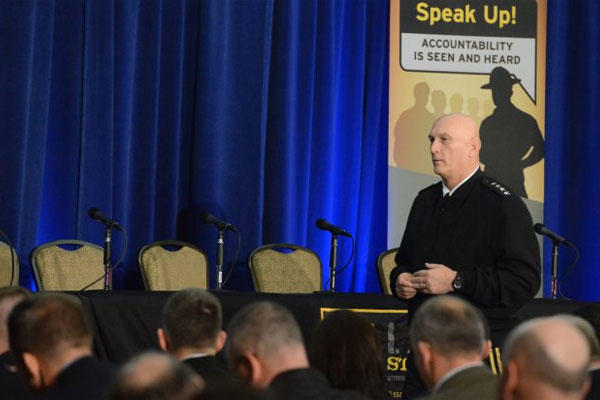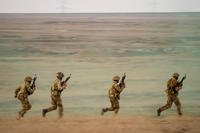WASHINGTON -- Victims of sexual assault who reported what happened faced disbelief and retaliation from others, according to five Soldiers who spoke to dozens of general officers, including the Army chief of staff.
They spoke at the "Survivor and Bystander Experiences: Retaliation and the Break of Trust" panel here during the 2015 Army Sexual Harassment/Assault Response & Prevention, or SHARP, Summit, Feb. 18.
Although more and more Soldiers are feeling confident to report sexual assault and harassment and the number of assaults are going down, challenges still remain and "the predators need to become the pariah, not the victim," Army Chief of Staff Gen. Ray Odierno said during the summit before the panel.
There are non-commissioned officers, or NCOs, and officers who still don't know what behavior is acceptable and what is not, Odierno said. The changing culture needs to begin with them and there needs to be conversations about it all the way down to the lowest levels.
Here are some of the stories of the victims, minus the graphic details:
OVERSEAS IN HARM'S WAY
Upon arriving in Afghanistan, a married female specialist said her worst fears were getting shot at by insurgents. Little did she realize, she said, that she would be harassed day after day, and then assaulted by her staff sergeant.
After this went on for a long time, she mustered the courage to tell her squad leader everything that happened, expecting him to elevate her concerns up the chain of command.
Instead, she said, he told her "let's squash this," so the perpetrator doesn't get in trouble. At that point, she said she lost faith in her leadership.
Eventually, another Soldier advised her to see the brigade SHARP representative, which she did. Word quickly spread throughout her company that she was a snitch, she said.
When she returned to a new unit stateside, she was approached by Soldiers she had never met who called her a snitch and a whining victim. The word had spread. The effects on her were devastating from emotional, mental and physical aspects, she said.
Her perpetrator, incidentally, was her own battalion SHARP representative.
SOCIAL MEDIA SEXUAL ASSAULTS
A female senior NCO was repeatedly humiliated and sexually harassed online in blogs and forums by Soldiers she knew and some who remained anonymous.
She explained what it means to be assaulted online. It is not just comments, she said. Soldiers post memes, which are "poignant and powerful messages."
Memes are images or graphics of people, usually accompanied by a few words, she explained. Memes are usually positive, with inspirational messages. However, sexual predators can use memes to attack their victims.
She showed a number of slides where Soldiers had appropriated her photos and added words or graphics to them with sexual innuendos. There were comments sections where others commented on her in disturbing and negative ways. Also, private information was released about her.
When she took her concerns to the leaders of two Soldiers she had clearly identified as being perpetrators, she was told, she said, to shut off her computer or just not look at the offending content.
What occurred, she said, was especially difficult, because she had to continue to lead a large number of Soldiers and remain strong for them. "My leadership did not back me," she said. "As a leader, I want to change that for my Soldiers. I don't want this social media to control my life."
However, once content is on the Internet, it will always be there or on another site for future employers and others to see, she said, adding that she hopes the Department of Defense will get a better handle on what to do about this.
MALES GET ASSAULTED TOO
A male specialist checked into a new unit not realizing the severity of his welcoming initiation.
A number of Soldiers, including sergeants, came into his room, ripped off his pants and sexually assaulted him, he said.
What happened left him feeling emasculated and ashamed, he said, adding that he had trouble sleeping and functioning.
But the welcoming didn't stop there.
The hazings continued for him and others. For example, on his 22nd birthday, he was stripped and whipped with a thick leather belt until he was bleeding and could not sit for three days. All of this took place while his platoon sergeant, first sergeant and commander were watching. He said some of the Soldiers who did this were Rangers and snipers, who had medals for valor. In short, they were highly respected.
Eventually, he reported what took place and that is when the retaliation took place, going as far as having death threats, he said.
Yet, nothing happened, and he was forced to continue to live and work alongside his tormentors. He too, said leadership had failed him.
WEST POINT SHUNNING
A second lieutenant, who graduated recently from the U.S. Military Academy at West Point, New York, told her story.
Her company's tactical NCO secretly filmed her and other cadets in the shower for at least her freshman year, she said, explaining that tactical NCOs are charged with looking after the welfare of around 100 to 120 cadets.
The videos came to light by chance, she said. Someone had left a disc in a computer and a cadet had found it and brought it to her attention.
After discovering what happened, she asked for an investigation. Two investigations went unfounded, meaning nothing happened, she said.
While the investigations were ongoing, she requested to change companies. "This is where the retaliation piece comes in," she related. "It's shocking to see your whole company, except for a handful of people, turn against you, not talk to you, physically turn their backs to you."
Her leadership failed her as well, she said. Her tactical NCO, a sergeant first class, had many awards and was beloved. "I was just a cadet with no credentials," she said.
"I don't blame any of my classmates or my company mates for turning their backs on me," she said. "I blame the leadership, which failed me on so many levels."
The second lieutenant said she hopes to use her experiences to help change Army culture, emphasizing that character is just as important as competence and commitment. People fail when it comes to judging character, she said.
It is hard to disbelieve a Soldier with a stellar record and reputation. Leaders need to do a better job following through when an assault or harassment is reported, she added.
RAPIST CONTINUED RAPING
A female specialist was a private at the time. One day, her sergeant drugged her and assaulted her all night in a hotel.
When she reported the incident, those in her chain of command did not believe her, she said. The Soldier who did this had a good record and was well liked by everyone.
Then the retaliation started. She was called names, hazed, counseled and belittled and degraded in front of her platoon with her first sergeant and commander present, she said. "I didn't know who to trust or who to go to."
Her platoon sergeant, a sergeant first class, told everyone that "she has a whore in her ranks." So she elevated her concerns all the way to the battalion commander and still nothing was done.
Six months later, her perpetrator raped another Soldier. "Another woman was assaulted who didn't need to be," she said, adding that she had feelings of guilt. "Did I elevate my concerns high enough?" she often wondered.
Eventually, after a fourth woman was raped, the perpetrator was nabbed and is now serving a 35-year sentence.
The takeaway from all this is that "as leaders you have to protect the victims and follow through with an investigation, even when it's your buddy," she said, adding that it's especially hard because there is "a human tendency to want to side with those who you respect and serve with -- sweep it under the rug."






























